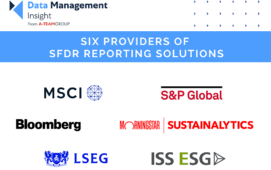
In many ways 2021 was a watershed year for ESG.
The European Union’s implementation of Sustainable Finance Disclosure Regulation (SFDR) began in earnest and other regulators around the world – especially in the UK – indicated they may soon follow suit.
The COP26 United Nations climate summit later in the year provided a galvanising impetus for governments, corporates and financial companies alike to begin demonstrating a commitment to reducing their carbon footprints and tightening disclosures.
And all the while, the total value of dollars invested in sustainable finance continued to surge; a record US$649 billion flowed into ESG funds, according to Refinitiv, with total outstanding investments in sustainable assets expected to reach $50 trillion by 2025.
With such stage setting in place, 2022 promises to be no less of a critical 12 months, with vendors and managers predicting changes on the regulatory front as well as in data access and consumption.
Data is the primary ingredient in ESG disclosures and regulations that cover them. As such, market participants see the continued refinement of the the industry’s raw material in 2022.
“ESG is a fast-moving space where disclosure requirements and climate risk are driving agendas,” Brad Foster, Head of Enterprise Content at Bloomberg tells ESG Insight. “We see this through regulations like the EU Taxonomy and SFDR and from conversations we’re having with our clients. The need for dependable ESG data is the common thread here to comply with regulations and effectively manage climate risk across transitional and physical factors.”
Data Quality
The reliability and quality of data will be key to ensuring the integrity of disclosures and to eliminating greenwashing, something that Volker Lainer, Vice President of Product Management and Regulatory Affairs at GoldenSource said will be a focus of 2022.
“Growth in sustainable finance is essential to achieving the environmental targets countries are signing up to, so it’s imperative that more is done to tackle greenwashing in 2022,” Laine explains.
“Financial institutions are calling for more collaboration between regulators and those creating the ESG reporting framework to get consistency in ESG standards, but so far the guidance and regulation itself is vague.
“As the regulatory bodies play catch up, it’s positive to see greater commitment from national and supranational organisations. For the coming year, though, the problem is left firmly on the shoulders of fund managers and investors.
“Firms need to do their own fact-finding and scrutinise all ESG scoring data to get as close as they can to ensure there’s no greenwashing within their portfolios.”
More Sources
Janine Hofer-Wittwer, Senior Product Manager for Financial Information at SIX, agrees, arguing that greater volumes and sources of data will be needed as reporting requirements become more demanding and technical.
“The sourcing of high-quality and verifiable environmental, social and governance data is fundamental to ensuring firms unquestionably prove to investors the sustainability of their products and decisions,” Hofer-Witter says. “In order to do this, asset managers need to pull as much data from different sources, including alternative data sources, to create as full a picture as possible. This will in turn help to navigate the ESG landscape and enable firms to prove the long-term value of their investment decisions.”
With SFDR reporting of Scope Three emissions expected in early 2023, this year will be one in which companies must begin to tackle the thorny question of how to gather data from their broader supply chains. Charles Dodsworth, Senior Research Lead for ESG at FTSE Russell said this year would see the creation of such corporate reporting procedures.
“The climate occupied much of our attention in 2021 following COP26 and we expect this to continue into next year with further emphasis on sector decarbonisation pathways and Scope Three emissions,” Dodsworth comments. “At the same time, investors need to remain vigilant to further regulatory attention on sustainable investment following a multitude of consultations and investigations, particularly focused on transparency and greenwashing.”
Bloomberg’s Foster says the data behemoth is planning to release a product that captures the Scope Three emissions information of 50,000 entities.
Private Companies
But the issue will still be tricky as reporting firms will at some point be expected to include data from private companies that don’t make a habit of offering such information. MSCI says the “jury’s out” on whether private equity firms will be willing to begin reporting.
The company is optimistic, however. In an end-of-year outlook on the ESG space, MSCI says PE funds would likely go the way of publicly listed companies, which have begun submitting hard data after a period of paying lip service to concerned investors by offering only anecdotal evidence of their sustainability records.
“More transparency and less conjecture are what investors, and the world, will need to complete the puzzle on where emissions come from and how to bring them down; case closed,” it writes.
The EU announced at the end of 2021 that its Taxonomy climate Delegated Act will come into force this month, one of several major steps in the rolling out of its broader ESG reporting and disclosure measures. While the momentum for that is likely to continue within the bloc, the UK will begin setting its own regulations this year, argues Element 22 partner Mark Davies.
The UK’s Financial Conduct Authority (FCA) has begun considering whether it should take ESG data vendors and data managers under its purview. At the same times it’s investigating how the country’s labelling guides can be codified to ensure sustainable finance products deliver what they promise.
Davies said he expects the FCA to make headway in establishing sustainable disclosure regulations (SDR) policy that will closely parallel those of the EU, but with an emphasis on consumer protections.
“There will be a much more natural link between, if you like, the product labels and the underlying data needs – data requirements and information gathering – than maybe we’ve seen in SFDR,” Davies tells ESG Insight.
“There’s going to be great overlap with SFDR, but I think in terms of messaging for 2022, most of the asset management communities are going to be watching very closely how that evolves and how that develops and… start to think about their own programmes or activity to comply with SDR when it comes in.”
Global Regulations
Like Davis, John Byrne, Chief Executive at RegTech company Corlytics, sees ample room for the Federal Reserve to start formulating policy too. Corlytics tracks the signals given by governments around the world to gauge their likely moves in terms of creating new rules. Byrne has logged a huge amount of advance guidance from the US since the inauguration on the Biden White House last January.
“If you look at the sum of all the financial regulations between, say, 1980 to date, in the next three years that same number of regulations are going to be added to the ESG space,” he said. “We ain’t seen nothing yet in terms of volumes of regulations that are coming down.”
The reason for this, he argues, is the growing understanding that ESG will be a factor in every financial transaction and decision, from bond and equity purchases to property, commercial and domestic loans.
“Every single asset that’s financed is going to be impacted by climate change,” he says.
From his tracker Byrne expects recent “aspirational” statements made about climate pledges in government press releases and official comments to solidify into policy. Those statements have come predominantly from the EU and UK but the growth in signals from the US has also been matched by comments out of Hong Kong and other advanced emerging markets.
The S and the G
While most attention has fallen on the environmental part of the ESG equation, 2022 is likely to see the social and governance aspects get more attention. LSEG’s Dodsworth sees the recently approved OECD global corporate tax deal as a starting point for companies to look at their activities’ impact beyond climate risk.
”On the back of this we expect investors will need to rapidly review tax risks in their portfolios – an area where corporates have been notoriously opaque.”
Corlytics’ Byrne believes that inequalities exposed by the pandemic has provided a wake-up call to stakeholders that private financing can do more than help ease the climate crisis
He points to the difficulty that some communities and socio-economic groups had in accessing vaccines and treatments, as well as the increasingly apparent financial exclusion many people face, as underlining the need to address the S in ESG.
“S is not very well developed,” he says. “Diversity is a big issue, disclosures, transition risks, reputational risk, green bonds, circular economy, social impact codes of conduct, greenwashing, physical risks, social factors – they are all going to have to be included.”
Subscribe to our newsletter




